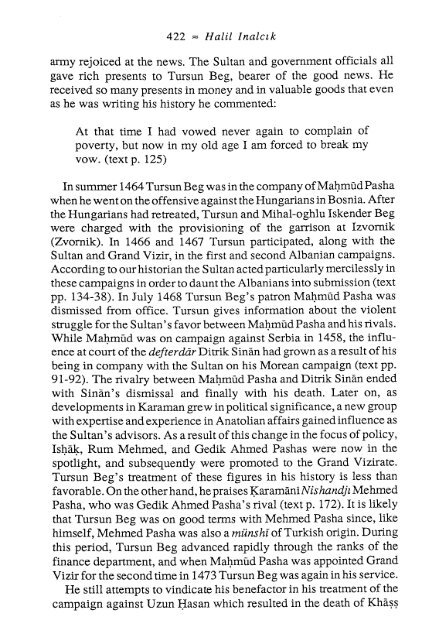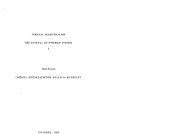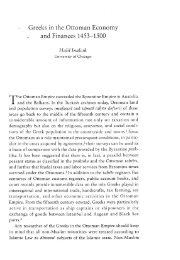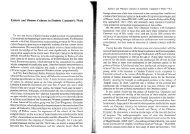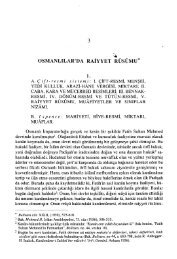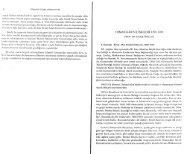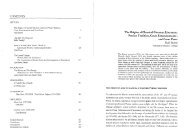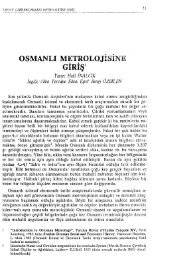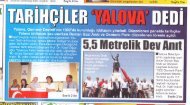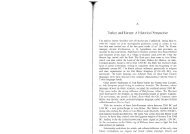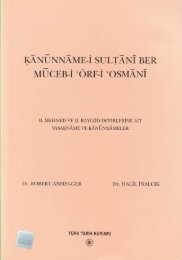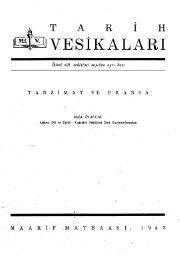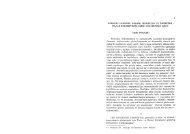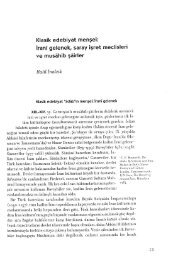Tbrsun B.g, Historian of Mehmed the Conqueror's Time
Tbrsun B.g, Historian of Mehmed the Conqueror's Time
Tbrsun B.g, Historian of Mehmed the Conqueror's Time
Create successful ePaper yourself
Turn your PDF publications into a flip-book with our unique Google optimized e-Paper software.
422 = Halil Inalctk<br />
army rejoiced at <strong>the</strong> news. The Sultan and government <strong>of</strong>ficials all<br />
gave rich presents to Tursun Beg, bearer <strong>of</strong> <strong>the</strong> good news. He<br />
received so many presents in money and in valuable goods that even<br />
as he was writing his history he commented:<br />
At that time I had vowed never again to complain <strong>of</strong><br />
poverty, but now in my old age I am forced to break my<br />
vow. (text p. I25)<br />
In summer L464Tursun Beg was in <strong>the</strong> company <strong>of</strong> MahmDdPasha<br />
when he went on <strong>the</strong> <strong>of</strong>fensive against <strong>the</strong> Hungarians in Bosnia. After<br />
<strong>the</strong> Hungarians had retreated, Tursun and Mihal-oghlu Iskender Beg<br />
were charged with <strong>the</strong> provisioning <strong>of</strong> <strong>the</strong> garrison at Izvornik<br />
(Zvornik). In L466 and 1467 Tursun participated, along with <strong>the</strong><br />
Sultan and Grand Vizir, in <strong>the</strong> first and second Albanian campaigns.<br />
According to ourhistorian <strong>the</strong> Sultan actedparticularly mercilessly in<br />
<strong>the</strong>se campaigns in order to daunt <strong>the</strong> Albanians into submission (text<br />
pp. 134-38). In July 1468 Tursun Beg's patron Mahmtd Pasha was<br />
dismissed from <strong>of</strong>fice. Tursun gives information about <strong>the</strong> violent<br />
struggle for <strong>the</strong> Sultan's favor between Mal-lmfld Pasha and his rivals.<br />
While Mahmtd was on campaign against Serbia in 1458, <strong>the</strong> influence<br />
at court <strong>of</strong> <strong>the</strong> defterdarDitrik Sinan had grown as aresult <strong>of</strong> his<br />
being in company with <strong>the</strong> Sultan on his Morean campaign (text pp.<br />
9l-92). The rivalry between MatrmDd Pasha and Ditrik Sinan ended<br />
with Sinan's dismissal and finally with his death. Later on, as<br />
developments in Karaman grew inpolitical significance, a new group<br />
with expertise and experience in Anatolian affairs gained influence as<br />
<strong>the</strong> Sultan's advisors. As aresult <strong>of</strong> this change in <strong>the</strong> focus <strong>of</strong> policy,<br />
Ishak, Rum <strong>Mehmed</strong>, and Gedik Ahmed Pashas were now in <strong>the</strong><br />
spotlight, and subsequently were promoted to <strong>the</strong> Grand Vizirate.<br />
Tursun Beg's treatment <strong>of</strong> <strong>the</strong>se figures in his history is less than<br />
favorable. On <strong>the</strong> o<strong>the</strong>r hand, hepraises (aramdnTNishandit<strong>Mehmed</strong><br />
Pasha, who was Gedik Ahmed Pasha's rival (text p. L72).It is likely<br />
that Tursun Beg was on good terms with <strong>Mehmed</strong> Pasha since, like<br />
himself, <strong>Mehmed</strong> Pasha was also a milnshl <strong>of</strong> Turkish origin. During<br />
this period, Tursun Beg advanced rapidly through <strong>the</strong> ranks <strong>of</strong> <strong>the</strong><br />
finance department, and when Mairmld Pasha was appointed Grand<br />
Vizir for <strong>the</strong> second time inl473 Tursun Beg was again in his service.<br />
He still attempts to vindicate his benefactor in his treatment <strong>of</strong> <strong>the</strong><br />
campaign against Uzun Hasan which resulted in <strong>the</strong> death <strong>of</strong> Khlss<br />
Ttrrsun Beg, <strong>Historian</strong> <strong>of</strong> <strong>Mehmed</strong> <strong>the</strong> conqueror's <strong>Time</strong> = 423<br />
MurD.d Pasha (text p. 53). Tursun Beg does not even so much as<br />
mention Mahm0d Pasha's execution. Saying that sultans act with <strong>the</strong><br />
guidance and inspiration <strong>of</strong> God, Tursun Beg refrains from speaking<br />
critically <strong>of</strong> <strong>the</strong> Sultan. Never<strong>the</strong>less, he does not hesitate to voice<br />
general cornments about <strong>the</strong> <strong>Conqueror's</strong> excessive temper (text pp.<br />
24-25) and impulsiveness (text pp.74, 153). Fur<strong>the</strong>rmore, Tursun<br />
tries in his history to demonstrate how Mahmud was always in <strong>the</strong><br />
right in his decisions, whe<strong>the</strong>r as military commanderor as statesman.<br />
Tursun was active in Malrmld's service, aiding him in all his state and<br />
personal business in <strong>the</strong> role <strong>of</strong> a close assistant. As a poet and literary<br />
man Tursun was included in Mahmtd Pasha's private meetings in<br />
which current politics, literature and o<strong>the</strong>r intellectual subjects were<br />
discussed (text pp. 23-28). During one <strong>of</strong> <strong>the</strong>se meetings Hayati, a<br />
poetknown forhis wit and sense <strong>of</strong> humor, composed a taunting ve se<br />
addressed to Tursun Beg. According to <strong>the</strong> story in Sehi's Hasht<br />
Bihisht,33 Tursun never forgot this insult and was later held responsible<br />
for Hayati' s being put to death. After 147 Tursun Beg, as a highranking<br />
<strong>of</strong>ficial in <strong>the</strong> Dlvan, accompanied <strong>the</strong> Sultan on <strong>the</strong> campaigns<br />
which he personally led. As aresult <strong>of</strong> his being present in <strong>the</strong><br />
Moldavian campaign (summer 1476), <strong>the</strong> campaign against <strong>the</strong><br />
Hungarians (winter L476), and in <strong>the</strong> campaign in Albania (summer<br />
147 8), Tursun Beg was in a position to give interesting original details<br />
concerning <strong>the</strong>se campaigns. But it is evident that he was not present<br />
in <strong>the</strong> campaigns commanded by <strong>the</strong> pashas in which <strong>the</strong> Sultan did<br />
not take part. As a result, his information on <strong>the</strong> events in Karaman<br />
(7468-74), <strong>the</strong> crimean campaign (1475), rhe siege <strong>of</strong> Lepanto<br />
(1477), and <strong>the</strong> campaigns against Rhodes and otranto (1a80) is<br />
limited, and his treatment <strong>of</strong> <strong>the</strong>se campaigns in <strong>the</strong> history is brief and<br />
<strong>of</strong> a general character.<br />
According to what he himself says in his history, it is clear that after<br />
forty years <strong>of</strong> government service, Tursun Beg went into retirement<br />
and was allotted <strong>the</strong> retirement pension set aside for members <strong>of</strong> <strong>the</strong><br />
religious institution.3a During <strong>the</strong> time in which he was occupied with<br />
writing his history, Tursun Beg was living in Bursa, and his name is<br />
mentioned many times in <strong>the</strong> Bursa Court Records for <strong>the</strong> years 889/<br />
7484,892/L487, and 896/L491 in connection with various undertakings.<br />
In an entry dated 25 Djumada II 889/20 July 1484, <strong>the</strong> now<br />
venerable old man, author <strong>of</strong> our history, is referred to as "iftikhar ala"yan<br />
Tursun Beg bn. Hamza Beg." From ano<strong>the</strong>r <strong>of</strong> <strong>the</strong> entries in<br />
<strong>the</strong> Bursa court records we learn that Tursun Beg's wife was Selguk


